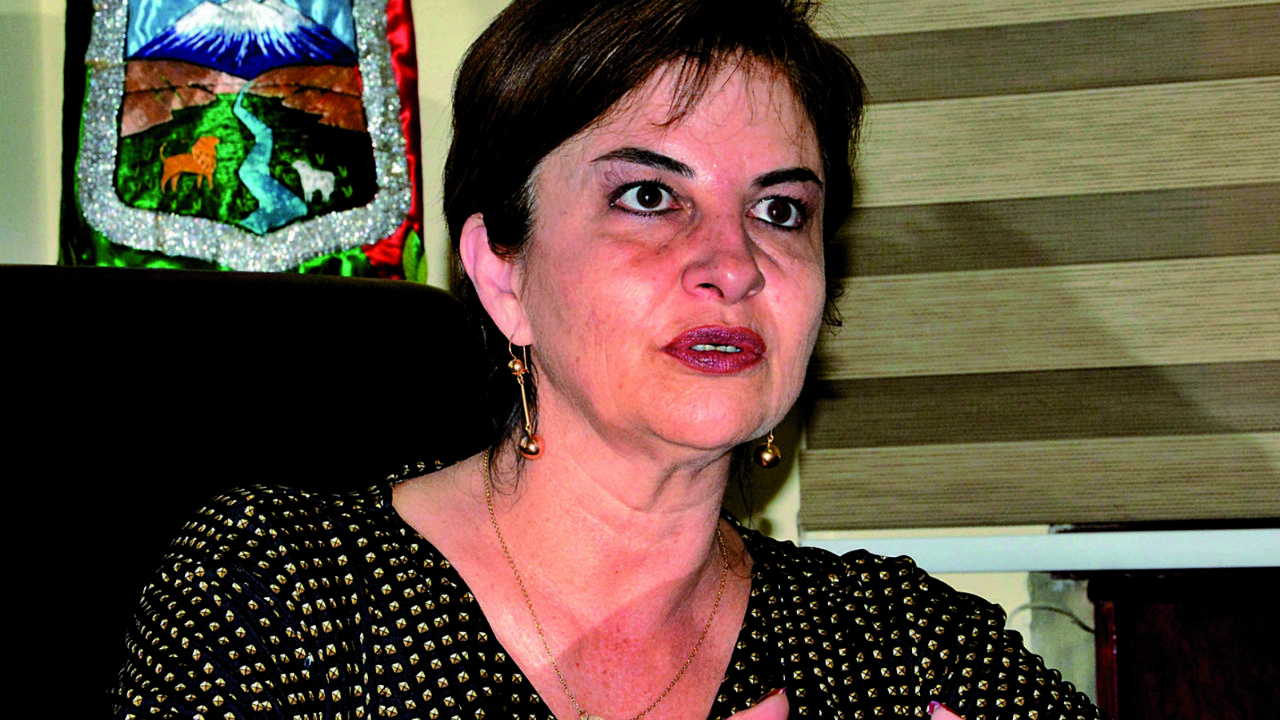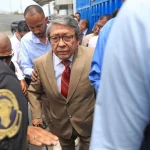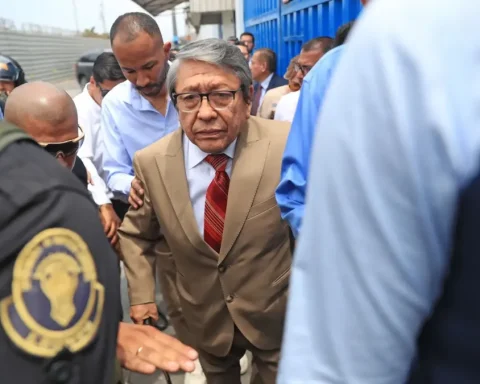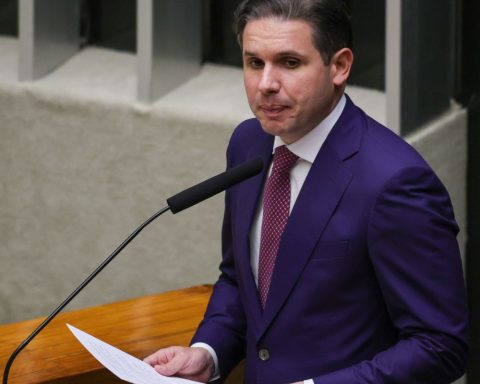Alcides Flores M. / La Paz
At 10:00 p.m. on a Sunday in early 2021, he received a call from an unidentified person on his cell phone. She never answers someone’s phone who isn’t in her directory, least of all at that time of night. But for some reason, that for now she still can’t explain, she answered the phone: it was Iván Arias, the now mayor of La Paz, someone she had never spoken to before.
That call turned his life around, because until then he had never even fantasized about entering the almost always whipped universe of politics, or with the idea of working in public administration. And now she is the president of the Municipal Council of La Paz.
This is Yelka Maric, a La Paz who until 2021 dedicated herself to her export company Madres y Artesanas (textiles) for two decades. Now this businesswoman has learned that to carry out a project it is not only necessary to give orders, but essentially to persuade the other.
When did your foray into politics begin?
All my life I have been in the private sector, until May 3, 2021, when I began to be a public official. When the universe conspires, it must be for something.
The year of the pandemic was complicated for all textile companies. One Sunday in December he was returning from Copacabana, where he had gone with the ladies heads of the workshop (his company) to thank us because we had had enough clients not to close. That allowed us to survive. So we were back from Copacabana.
Are you Catholic?
No, but I am very respectful of all religions, and as manager I had to be with them in that act of gratitude. In that I receive a call at ten at night. I never answer calls from people who are not identified. Why did I answer? I don’t know, but I answered. It was Iván Arias, who invited me to be a councilor for the Mayor’s Office of La Paz and told me that he was waiting for me on Monday at 11:00 for an interview.
Didn’t you know Iván Arias?
In my life I had crossed paths with Iván Arias. He didn’t know me either. So they must have given you references about me, because I worked for 20 years in the textile area and for 20 years I have worked on the empowerment of women. It is a model under which the artisans have total flexibility of schedule, which is why their time allows them to be mothers, couples, housewives, income generators, be daughters, be friends. That is the model that I have been running for 20 years, for which I have been recognized by CNN and by other organizations.
And he accepted Iván Arias’s proposal for the council…
I accepted the interview and we had to have a conversation of no more than 40 minutes. And I accepted her proposal to go as a councilwoman. Precisely that year my two daughters left to study abroad. All that time that as a mother I dedicated to my daughters, after years of not being able to take on other types of tasks, I was free. So, I have proposed to begin to exist once they leave.
But you had never thought about getting into politics?
Public administration has never been in my plan. I dedicate myself to the topic of entrepreneurship, entrepreneurship. My plan has always been to encourage, direct women who start businesses, who have economic autonomy, because economic autonomy is definitely the way to actively fight against violence against women.
That year also of the covid, before the invitation of Iván Arias, they appointed me ambassador of “Emprende México” here in Bolivia, which is the first online Latin American company aimed at women with a low-medium academic level, which uses a language accessible, understanding that there is no university training involved.
And how had the world of politics been?
At first it shocked me enormously: very unpleasant, very exhausting. You find yourself with intransigent positions, dialogue of the deaf. It is a place of the one who shouts more. Unfortunately, the one who shouts the most is the one who doesn’t think to listen to the other.
I appreciate this experience. Despite all the discomforts that it has cost me to live, I have developed the subject of emotional intelligence. My patience levels have had to rise tremendously. Before, I was very impatient. Nothing works in politics with impatience.
It’s about listening to different points of view. Evidently, as manager of the Madres y Artesanas Company, he gave instructions. And now it was going from 25 years of giving instructions to persuading. In this world I cannot give instructions to anyone. It has been a great learning.
Governance
Apparently governance is not guaranteed in the Mayor’s Office.
This is a subject that I continue to analyze. It is not easy to agree on opinions, points of view with six councillors, because they come from different worlds. We have had different childhoods, we have had different adolescences, some of us have lived with more pain than others. Some have greater emotional intelligence than others, some have more wisdom than others, some are more technical than others, some are more political than others.
So, it is not a matter that we are not divided or that we do not have an objective that unites us, rather it is what unites us. The issue is the dynamics between us and the patience we have to have not only to listen to each other, but to put ourselves in the other’s shoes and not judge, because that’s where value judgments are made that are irrelevant. So, it’s a very interesting job.
In any case, governability is not guaranteed…
Are we going to call governability when everyone says the same thing whether they like it or not?
No… For example, if you, as Yerlka Maric, present a bill, Councilwoman Lourdes Chambilla, from the political front “Somos Pueblo”, which is an ally of “Por el Bien Común” (the political front of Iván Arias), absent and that slows down the realization of that project…
I want to see it in another way. I am taking this very philosophically, understanding that we do not all have the same academic level, that we do not all understand the laws and that we do not all have the profile to see the short and medium term of some regulation. Unfortunately, the times are short, decisions are made as a bench, but the councilor possibly requires more time.
We are missing those details: procedures and a methodology. Nobody is allologist. One is an administrator, another is a political scientist, another is a carrier, another is a neighborhood leader. So, when we analyze, for example, the regularization law, we will have to bring in architects and engineers, specialists so that there is a complete reading of the panorama.
Photo: Víctor Gutiérrez / Page Seven
As president of the Council, it is not very easy for you because you have as an ally a councilor (Chambilla) who has shown signs that she is not entirely with you. That is why Arias feared a blow.
Precisely, as the Mayor stated, it is about working in a much more cohesive way. That is to say, not only that each council member leave with his advisers, but that the analyzes are done in work groups, otherwise we will have results that are not entirely consensual. I want to believe so. Of course there have been demonstrations like the ones you mention.
In any case, the Chambilla factor is not very easy for the municipal government.
It is something that moves us the floor, yes. I definitely want to believe that it is a matter of a different way of thinking. We must also learn to understand each other and unite. We are missing time together.
But perhaps it is also due to another factor: Rafael “Tata” Quispe. It seems that he is the one who marks the path that Councilor Chambilla must follow, right?
Could be.
Do you see Quispe’s hand in Chambilla’s actions?
Of course yes. On the other hand, I have also said it in the plenary session of the Council: I have no problem, and I repeat the words that I have poured, that the councilor tomorrow be the president of the Council. I work many years in the empowerment of women. An empowered woman means that she has changed the “I have to” for the “I want”. Unfortunately I still see that she says, does and follows the instructions of Mr. Rafael Quispe. When I see an empowered woman, I can give her my vote.
How do you see the role of the MAS councilors in the Mayor’s Office?
The MAS councilors have a very clear mandate. They are people of different streams. They are basically people with a good level of preparation and experience, and with a very clear guideline for hindering and delaying the decisions that make the management of Iván Arias. I can put my hands to the fire that even if it is the best Annual Operating Plan (POA), they will never approve it. Moreover, surely, they would not even abstain. Surely they have the guideline or the instruction because they are from a party structured for many years where the councilors do not make the final decision, but rather receive instructions. Facilitating the management of Iván Arias is not within its objectives or mandates. I would not call it a propositional -minority- bench. I mean, they’re doing their job.
And what does your job consist of?
Follow the instructions of the political party’s staff and delay and hinder the management of Iván Arias, who is a mayor not related to the ruling party.
It could be said then that their interest is not La Paz, but the party.
What corresponds to the minority caucus is more than anything the inspection agenda. And yes, they are dedicated to putting all their efforts into enforcement. In some way, they are looking out for the interests of the people of La Paz.
Can you quantify the laws that the MAS has proposed?
There are laws that are symbolic and others that are substantive. Among the substantive laws proposed by them is the pardon, which has actually been a joint effort by the commission. It is a law in which we have articulated the majority caucus, the minority caucus and the Executive Branch.
There is also the regularization law, which has come from the MAS caucus, which was a necessity for the city of La Paz. It came not in the way that I would have liked, but I have to admit that it has been a substantive proposal from the minority caucus. The other laws are more symbolic, like the economic development law for Mallasa. When you do not articulate with the Executive Branch, it is like passing a law that prohibits pollution, but who is going to control it?
What are your main objectives as president of the Municipal Council?
I have in mind a model of urban co-responsibility that I have brought from the University of Monterrey, in Mexico. It is a matter of transformation. It is one of the successful experiences in Latin America that has worked, which consists of finding the form, space and methodology that articulate the private sector, the public sector, the academic sector and the neighbors. Together they articulate, organize and achieve what they achieve.
Along these lines, the plan has already begun to be executed with the signing of agreements with the Bolivian Catholic University, the Private University, and soon with the UMSA. That means that in the projects, university students contribute with design, architecture, engineering. The private company contributes with resources, because a work attracts more people. The municipal government provides the workforce, the technical part, and the neighbors, who at the time of participating in all this methodology, are part of the design, approve it and take care of their square, for example. People take care of their park because they have been part of the whole process.
As far as I am concerned, it is a matter of management, of being hand in hand with the Executive Branch, of having a legislative agenda to respond to all the problems with an order of priorities. It is up to us to be a factor of cohesion.
CV
- yelka maric He was born in La Paz. His last name comes from his Croatian grandfather. They are 4 brothers and has two daughters.
- Study Business Administration at the Bolivian Catholic University.
- Have Master’s degree in Business Economics in Costa Rica.


















